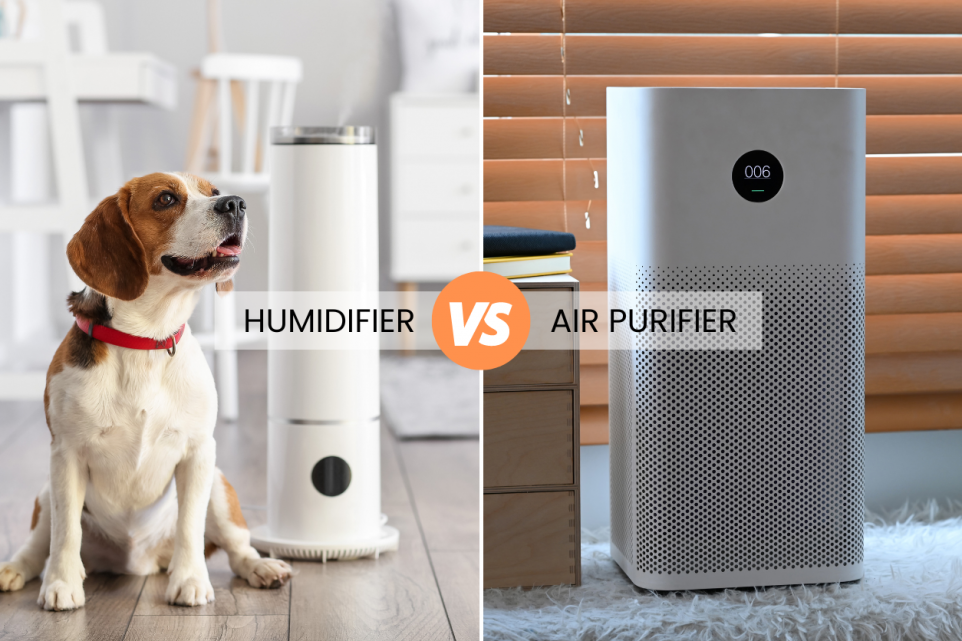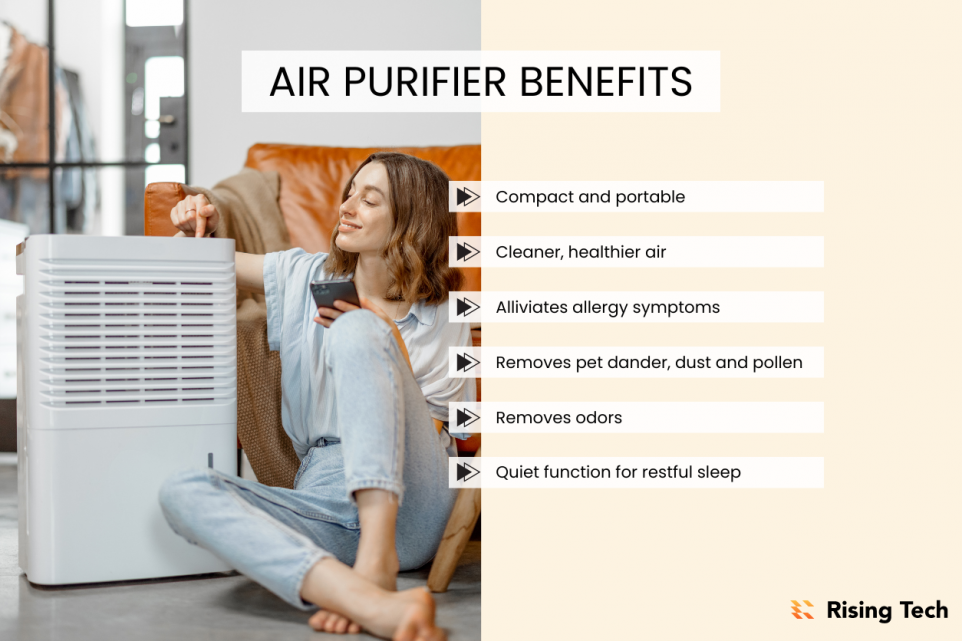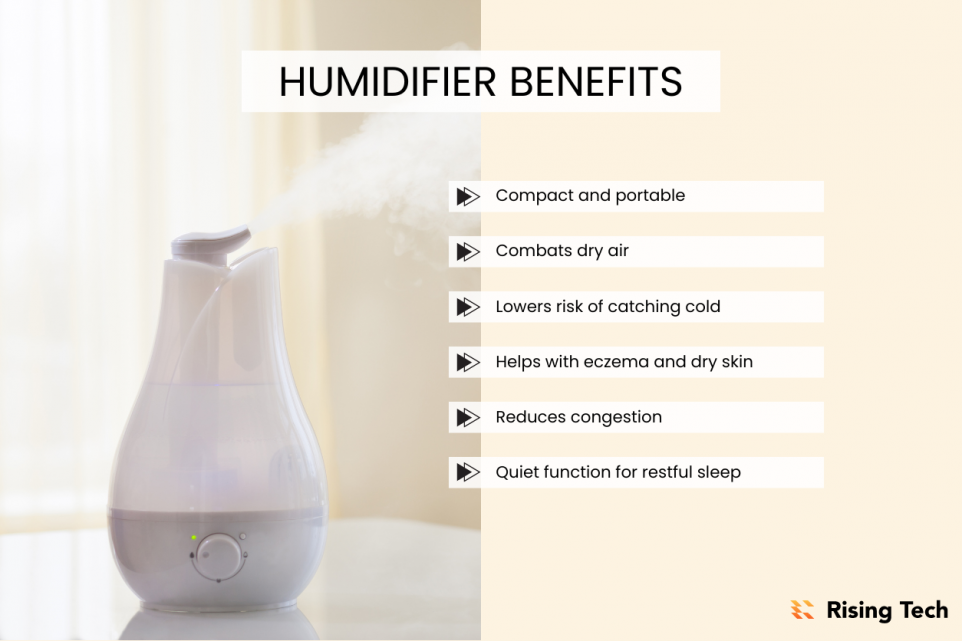Humidifier vs. Air Purifier: Which One Should Pet Owners Get?

Living with pets is a bit like being in a loving (and sometimes messy) relationship. From the joyous tail wags and purrs to the inevitable tumbleweeds of fur and mystery scents, life with our four-legged friends keeps us on our toes. As a pet parent myself, I know the challenges of keeping my home clean and breathable. Humidifiers and air purifiers are two devices that can help with this.
A common question I get is if a humidifier and air purifier is the same. And the answer is no. But which one do you need for your home? Let’s dive into the specifics of humidifiers and air purifiers, and how they can help with dander, allergies, dry air and more.
Humidifier vs. Air Purifier
Air purifiers are the heavy lifters when it comes to cleaning your air. They tackle all the pet dander, fur, and odd pet odors head-on, especially if they’re equipped with a HEPA filter for particles and a carbon filter for odors. It’s all about snatching those irritants and smells out of the air before you even notice them.
Humidifiers, on the other hand, aren’t about cleaning the air; they’re about adding moisture back into it. If you’ve noticed your skin feeling dry or you’re waking up with a scratchy throat, it’s probably because the air in your home is too dry, which is surprisingly common in homes with central heating or air conditioning. Humidifiers can help with that, making the air more comfortable for you and your pets.
And here’s a thing—they each play different roles but can totally complement each other. Using a humidifier alongside an air purifier can create a just-right environment: the purifier cleans the air, while the humidifier adds back essential moisture. If your air feels dry, adding a humidifier into the mix can also help reduce static and keep your wooden furniture from drying out.
If you’re looking to get the benefits of both without doubling up on devices, there are some neat combo units out there that merge an air purifier and a humidifier into one. So, whether it’s dander, fur, or just keeping the air nice for breathing, there’s definitely a way to make sure your air treatment game is as strong as your pet game.
Are Air Purifiers Effective Against Pet Allergies?

I’ve got pets, so I know the struggle with fur and sneeze-inducing dander all too well. An air purifier with the right filter can be effective in combatting pet-related issues. For those battling lingering pet odors, an air purifier with an Activated Carbon filter captures even the smallest odor molecules that pets leave behind, keeping your living space smells fresh.
If allergies are your main concern, look for an air purifier boasting a True HEPA filter. This filter is your best defense against the minuscule particles of pet dander that trigger sneezing, itching, and other allergic reactions. True HEPA filters can trap 99.97% of particles as small as 0.3 microns, effectively reducing allergens in your environment.
And for pet hairs that seems to find their way into nooks and crannies, an air purifier with a pre-filter or HEPA filter can address this issue. As air circulates through the purifier, these filters work to catch floating hair, preventing it from settling around your home.
Different Types of Humidifiers
With all the types of humidifiers out there, how do you know which one to pick for your pet’s needs? Let’s break down the options and some must-know tips for using them safely—especially when you’ve got curious pets or kids around.
First up, we’ve got evaporative humidifiers. These guys work by pulling air through a damp filter—simple and effective. They’re on the cheaper side and not too hard to handle, but they can get a bit noisy. The main thing? You have to keep them clean to avoid turning them into a petri dish.
Then, there are ultrasonic humidifiers. These use high-frequency vibrations to create a fine mist. They are super quiet and energy-efficient, which is awesome, but they can be pricier. Regular cleaning is a must here, too, because no one wants mold or bacteria hanging around.
Steam humidifiers are like the heavyweights. They boil water to create steam, which is great for adding moisture but can be a bit risky around the little ones or pets if they get too close. Always keep these out of paw and hand reach.
And don’t forget about impeller humidifiers. These use a spinning disc to fling water into the air as a cool mist. They’re quieter and generally cheaper than ultrasonics but can be less effective.
Are Humidifiers Safe for Pet Owners?

When it comes to balancing indoor air quality with the safety of children and pets, humidifiers play an important role. But, there’s a bit of a twist when you toss in those bacteria killers some models use.
First off, most humidifiers are pretty safe. They add a nice mist to the air, which feels great. But if you’re like me, keeping an eye on the humidity levels becomes essential. Too much moisture can turn your place into a playground for mold and mildew—no thanks!
And here’s where it gets tricky with kids and pets. They’re curious, right? Mine are always poking around where they shouldn’t. So, I’m extra cautious about the types of bacteria killers in the humidifier. Some of these can be harsh, and you really don’t want those little hands or paws messing with them.
Here’s how I keep things safe:
- I stick to cleaning the humidifier regularly. It’s a chore, but it keeps nasty stuff from building up.
- I only use products marked as safe for kids and pets. They’re usually made with less harsh chemicals.
- I keep an eye on the humidity with a hygrometer—aiming for that sweet spot between 30% and 50% to keep things comfy without the mold worry.
- Use distilled water to avoid mineral buildup, and clean the unit weekly to prevent mold or bacteria from growing.
- I place the humidifier up high or in a spot where my little explorers can’t get to it.
Which One Should You Choose?
If you’re dealing with allergies or respiratory issues or want to eliminate pet odors and dander effectively, an air purifier is indispensable. It directly tackles these problems by filtering out particulates and odors from the air, making it essential for maintaining air quality and your health.
On the other hand, a humidifier is best suited for addressing dry air issues, which can be beneficial but doesn’t directly combat the allergens or odors associated with pets. Therefore, for most pet owners, an air purifier would likely be the more crucial choice to ensure a cleaner, healthier living environment for both you and your pets.
Your Trust, Our Core Commitment
At Rising Tech, earning and maintaining your trust is the cornerstone of our mission. We're dedicated to transparency, impartiality, and the relentless pursuit of truth in every article, review, and recommendation we publish. Our commitment to these principles ensures that you, our valued reader, are always equipped with reliable and unbiased information. Let us be your trusted guide in the ever-evolving world of technology.